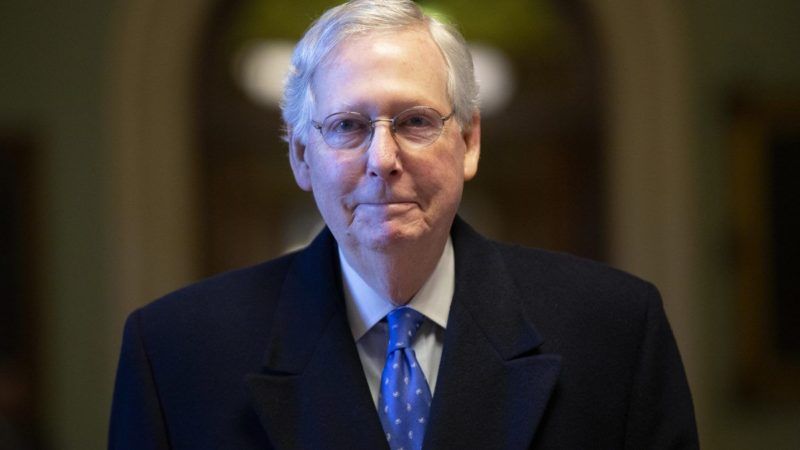McConnell Says Trump's Articles of Impeachment Are 'Constitutionally Incoherent.' But Are They?
The Senate majority leader announced he will acquit President Trump.

Senate Majority Leader Mitch McConnell (R–Ky.) on Tuesday railed against the articles of impeachment facing President Donald Trump, characterizing them as an affront to the founding fathers and an attempt to overturn the 2016 election. It is the "the most rushed, least fair, and least thorough" impeachment process in history, McConnell said, a call back to his first speech on the Trump impeachment in December.
Trump was impeached by the House of Representatives for abuse of power and obstruction of Congress over his role in pressuring Volodymyr Zelenskiy, the president of Ukraine, to announce probes that targeted Trump's political rivals.
The articles of impeachment are "dangerous" and "constitutionally incoherent," according to McConnell. But are they?
On the first charge, McConnell said that the House pursued the matter "without alleging a crime known to our laws." While he clarified that he does not believe that impeachment requires a criminal offense, he nevertheless argued that lawmakers "gave in to a temptation that every previous House has resisted." In other words, while McConnell agreed with the majority of legal scholars that "High crimes and misdemeanors" does not necessitate committing a literal crime, he implied that, in effect, a criminal violation should still be present for a valid impeachment.
That argument is an homage to the defense put forth by Alan Dershowitz, the retired Harvard professor and lawyer for Trump. Though Dershowitz said in 1998 that an impeachable offense "certainly doesn't have to be a crime," he has since altered his view. In his 2018 book, The Case Against Impeaching Trump, Dershowitz maintained that an impeachable offense must be criminal, and during the current proceedings, he argued it must instead be "crime-like." His evolving stance cuts against the legal consensus, which contends that abuse of power is a core impeachable offense.
He now disagrees with that consensus. According to Dershowitz, a quid pro quo allegedly put forward by Trump in an attempt to increase his chance for re-election is not impeachable on its face because, in Trump's mind, keeping his grip on the Oval Office is in "the public interest."
McConnell seemed to reference that questionable argument in his remarks today. "Such an act cannot rest alone on the exercise of a constitutional power," he said, "combined with concerns about whether the president's motivations were public or personal and a disagreement over whether the exercise of power was in the national interest."
As for the second article of impeachment—obstruction of Congress—McConnell likened it to "nonsense impeachment." He does have a point there. House Democrats, in seeking to push impeachment through at a rapid pace, opted not to subpoena the witnesses whom Trump blocked from testifying, since that would have required a lengthy process of litigation. "The decision not to subpoena directly relevant witnesses such as Giuliani, former National Security Adviser John Bolton, and acting White House Chief of Staff Mick Mulvaney was based on a desire to avoid time-consuming court battles over whether they could be compelled to testify," writes Reason's Jacob Sullum. "But as [Jonathan] Turley notes, rulings involving Trump's financial records and the testimony of former White House Counsel Don McGahn suggest that Congress would have won those battles."
Is there any doubt that Trump obstructed Congress? The president himself all but admitted as much. "We're doing very well. I got to watch enough," Trump said at the World Economic Forum, referring to his Senate impeachment trial. "I thought our team did a very good job. But, honestly, we have all the material; they don't have the material."
Yet McConnell seemed to view that statement by Trump in a different light. "House Democrats argued that any time the Speaker invokes the sole power of impeachment, the President must do whatever the House demands, no questions asked," he said. But McConnell said the president was under no such obligation, citing executive privilege.
Unlike McConnell, other Republicans have conceded that Trump acted improperly when he leveraged the power of his office for his personal benefit. "It was inappropriate," asserted Sen. Lamar Alexander (R–Tenn.). Trump's behavior was "shameful and wrong" said Sen. Lisa Murkowski (R–Ala.). Nevertheless, their basic argument aligns with that of the majority leader and can be adequately summed up by Alexander's closing remarks: "Even if the House charges were true," he wrote in a statement, "they do not meet the Constitution's 'treason, bribery, or other high crimes and misdemeanors' standard for an impeachable offense."


Show Comments (97)